

Raising readers - BBC Teach. How to Educate Yourself and Change the World, Just by Reading. There are so many reasons to read.
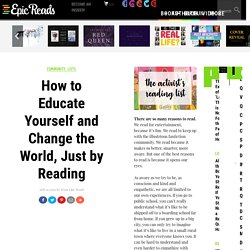
We read for entertainment, because it’s fun. We read to keep up with the illustrious fanfiction community. We read because it makes us better, smarter, more aware. But one of the best reasons to read is because it opens our eyes. As aware as we try to be, as conscious and kind and empathetic, we are all limited to our own experiences. How to Change the World We know that stories are magical. We remember them and guard them. Stories are our best and most potent tool of understanding.
A story can suck us in and explain things to us so clearly it’s like we’re seeing out of the characters eyes ourselves. That’s why it’s so important for us to read, broadly and hungrily. If you read only books about people who are like you, by people like you, it confirms the dark part of your brain that thinks the way you are and the way you do things is right. Print Story Books Encourage More Meaningful Interactions Between Kids and Parents.
The benefits of exposing kids to books at a young age are clear.
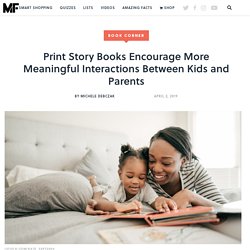
One study from 2018 found that reading out loud to kids improves their behavior, and according to a different study published that same year, children from homes filled with books grow up to have better reading comprehension skills. Now, new research suggests that not every type of book has the same impact. Reading on-screen vs reading in print: What's the difference for learning? October 10th, 2019By Lisa Allcott How well do your students learn when they read online?
What are the outcomes of on-screen reading compared with reading in print? Current research suggests that reading online results in lower understanding and less critical reflection. What might this mean for our students' learning and for society? This blog post was first published in March 2019. Boys & Reading — Mind the Bias.
Helping Students Set Better Reading Goals. An often asked question I receive is, “How do you help kids set a reading goal?”
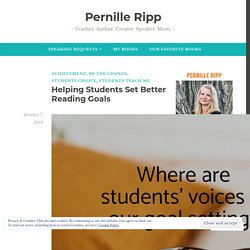
And while the answer really could be an entire book, I promised the Passionate Readers Facebook group that I would write a little bit about my process here. After all, perhaps something I am doing as I try to figure this out myself can help someone else, or perhaps, and this is often the case, somebody else has great ideas that they can share in the comments.
In the past, I used to set the reading goals for all of my students, after all, as the adult in the room I thought it was part of my job to set attainable goals for all students in order for them to read more, comprehend more, be more. And yet, whenever I sat with a student and we discussed these goals that I had pre-determined based on what I saw as their needs, unsurprisingly there wasn’t always full buy-in. It took me a few years to realize that part of the reason these goals failed was that they had little student input. Like this: Like Loading... Device or Paper? I Don’t Read. “I don’t read” has been a refrain heard loudly in our classroom for the last three weeks.
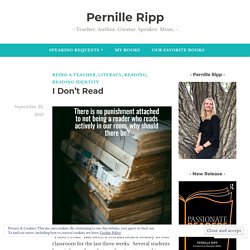
Several students have informed me that reading is not something they do. Not something we can get them to do. And they have been right. For the past three weeks, these few kids have stood by their words, proven them to be true and we have pondered what the solution may be. I bet those students are in your room as well. Reading for Pleasure — A Door to Success. Research points to certain factors that increase the likelihood of creating engaged readers. Choice relates to motivation Choice, interest and motivation are highly related. Neil Gaiman on Why We Read and What Books Do for the Human Experience. The question of why we read and what books actually do for us is as old as the written word itself, and as attractive.
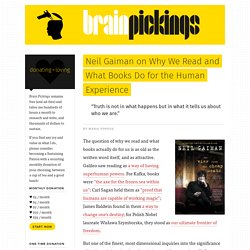
Galileo saw reading as a way of having superhuman powers. There Are Two Ways to Read - One Is Useless. Reading is telepathy, and a book is the most powerful technology invented.
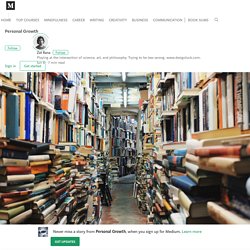
Homer, Shakespeare, Voltaire, Flaubert, Tolstoy, Woolf, Hemingway — these are names without a living body. We can’t talk to them, nor touch them, but their thoughts are immortalized through the written word. Aristotle’s logic, Kepler’s astronomy, Newton’s physics, Darwin’s biology, Wittgenstein's philosophy — these are memes without living originators. They no longer champion their ideas, and yet, we still talk about them. Without books, humans would never have escaped the boundaries of space and time. Everything that we value in the modern world has its root in invention of writing.
Even on an individual level, one of the most effective ways to learn about the world is to dip your toes into the wisdom of the past. What's Going On In Your Child's Brain When You Read Them A Story? How to Create Great Summer Reading Experiences. I know many of us educators (and those at home) have been working hard all year to try to cultivate or protect a love of reading in our learners.
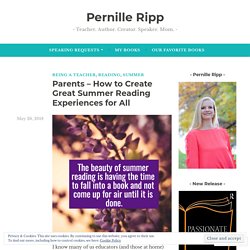
Now with warmer temperatures and summer beckoning for the Northern Hemisphere comes the real test; will kids keep reading over the summer? Is what we did enough? Did we lay enough of a foundation, get them excited, get them hooked so that the next few weeks or months will not put them in a reading drought? While time will truly be the judge of how the work might pay off, here are a few ideas that may help depending on the age of the learner. Have a to-be-read list. Visit places where books are present. Make it social.
Read aloud. Use audio books. Find great books. Create a routine. Allow real choice. Have books everywhere. Why Reading Books Should Be Your Priority. Reading fiction can help you be more open-minded and creative According to research conducted at the University of Toronto, study participants who read short-story fiction experienced far less need for "cognitive closure" compared with counterparts who read nonfiction essays. Essentially, they tested as more open-minded, compared with the readers of essays. "Although nonfiction reading allows students to learn the subject matter, it may not always help them in thinking about it," the authors write. "A physician may have an encyclopedic knowledge of his or her subject, but this may not prevent the physician from seizing and freezing on a diagnosis, when additional symptoms point to a different malady.
" Reading Fiction Makes You Happier. I know: you're on point, on task, and totally focused on achieving your professional goals.
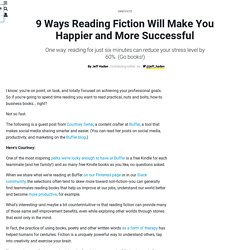
So if you're going to spend time reading you want to read practical, nuts and bolts, how-to business books... right? Not so fast. The following is a guest post from Courtney Seiter, a content crafter at Buffer, a tool that makes social-media sharing smarter and easier. (You can read her posts on social media, productivity, and marketing on the Buffer blog.) Here's Courtney: One of the most inspiring perks we're lucky enough to have at Buffer is a free Kindle for each teammate (and her family!) Benefits of Reading Aloud. It’s a truism in child development that the very young learn through relationships and back-and-forth interactions, including the interactions that occur when parents read to their children.
A new study provides evidence of just how sustained an impact reading and playing with young children can have, shaping their social and emotional development in ways that go far beyond helping them learn language and early literacy skills. The parent-child-book moment even has the potential to help curb problem behaviors like aggression, hyperactivity and difficulty with attention, a new study has found. “We think of reading in lots of different ways, but I don’t know that we think of reading this way,” said Dr. Alan Mendelsohn, an associate professor of pediatrics at New York University School of Medicine, who is the principal investigator of the study, “Reading Aloud, Play and Social-Emotional Development,” published in the journal Pediatrics. One More Time for the People in the Back. I don’t think that I can yell any louder.
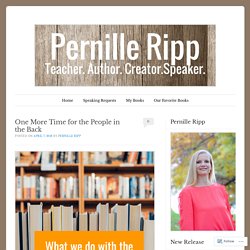
How many times that I have repeated myself on this blog. How many times I have repeated the voices of those who speak the words loudly, of those who spoke the words long before I ever did. I don’t think I can say it in other ways than I have, but I suppose one more time for good measure. For the people in the back of the room, or for those who just showed up. Teenagers aren't reading enough tough books – here's why that matters. We may be living in the digital age, but reading books is still a big part of growing up.
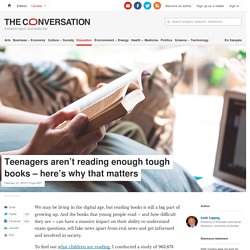
And the books that young people read – and how difficult they are – can have a massive impact on their ability to understand exam questions, tell fake news apart from real news and get informed and involved in society. To find out what children are reading, I conducted a study of 963,678 students in 4,364 schools across the UK. I found that from 2016 to 2017, students read 18,044,078 books: it sounds like a lot, but when I dug down into the data, I found some worrying trends. When they’re in primary school, children read books that really challenge them. But once they reach secondary school the level of difficulty doesn’t change much. Firm favourites To discover these trends, I analysed data collected by Accelerated Reader (AR) software, which quizzes pupils to check their understanding of the books they’ve chosen to read.
10 Benefits of Reading: Why You Should Read Every Day. When was the last time you read a book, or a substantial magazine article? Do your daily reading habits center around tweets, Facebook updates, or the directions on your instant oatmeal packet? If you’re one of countless people who don’t make a habit of reading regularly, you might be missing out.
Reading has a significant number of benefits, and here’re 10 benefits of reading to get you to start reading. 1. Mental Stimulation Studies have shown that staying mentally stimulated can slow the progress of (or possibly even prevent) Alzheimer’s and Dementia, since keeping your brain active and engaged prevents it from losing power. Just like any other muscle in the body, the brain requires exercise to keep it strong and healthy, so the phrase “use it or lose it” is particularly apt when it comes to your mind. 2. 3. What happened to reading in NZ? New Zealand came 30th out of 50 OECD countries in a recent study of childhood reading comprehension – a big drop since we topped that list 40 years ago and a downward slide not seen by other countries. Chief Executive of the NZ Book Council Jo Cribb says we're letting Kiwi kids down if we don't take action.
Adult literacy levels and reading habits play a role, Jo says. Help children choose kindness. What reluctant boy readers want. Reading for Pleasure: Ideas from the UK. When Adults Don't Read, Kids Lose. Note: This post was co-written with my friend Todd Nesloney, who is both the principal at Webb Elementary School in Navasota, TX and the coauthor of the book Kids Deserve It. Books can take you places Donald Trump doesn’t want you to go. Thank you, Captain Underpants. I am delighted to know that Captain Underpants will be coming out as a movie. Kwame Alexander: Try poetry. Among teachers and librarians, the term “reluctant reader” usually means one thing: a boy who avoids reading like you might avoid those steamed vegetables on your dinner plate.
Neil Gaiman: Let children read the books they love. Making Sure Children Get Language Nutrition. By Lauren Lowry Clinical Staff Writer and Hanen SLP. Why children should put down their phones and pick up a book. How to Help Students Develop a Love of Reading. How to read 200 books a year.